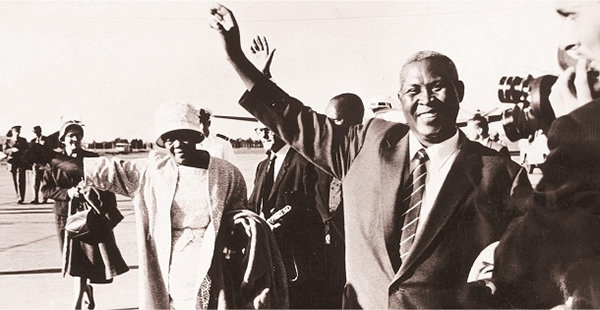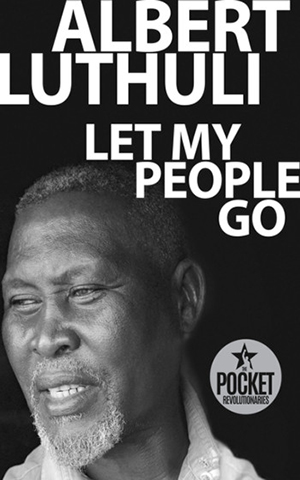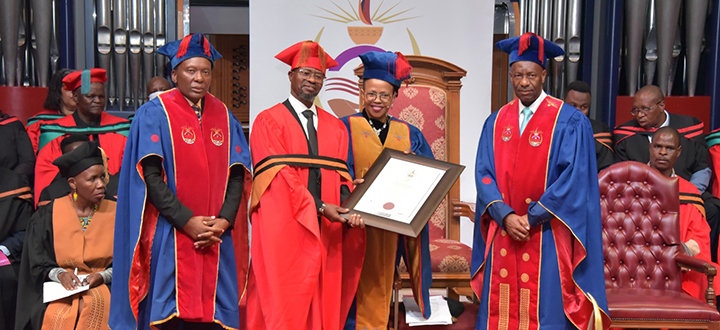College of Human Sciences
The feminist that was Chief Albert Luthuli
Chief Albert Luthuli believed in the importance of forging solidarities, and through his work also promoted gender justice. This was the sentiment presented at the second lecture of a three-part seminar series honouring the late teacher, activist and politician. The seminar series is being held by the Unisa Chief Albert Luthuli Research Chair, housed in the College of Human Sciences.

Photo: Luthuli Museum
Explaining the theme, Transnational Solidarities, Gender Justice and Chief Albert Luthuli’s Legacy and Ethos, was programme director, Prof Edith Phaswana, from the Thabo Mbeki African School of Public and International Affairs. She said Chief Luthuli was passionate about forging solidarities across different races, communists, liberals, religions, modernists and traditionalists. "His character commanded the survival and the impending progression of the anti-apartheid struggle and the formation of contemporary democratic South Africa," said Phaswana.
Research approaches and methods to analyse GBV
Welcoming guests and providing opening remarks was Prof Thenjiwe Meyiwa (Vice-Principal: Research, Postgraduate Studies, Innovation and Commercialisation). She said much has been written in South Africa and beyond about Chief Luthuli’s legacy, but his philosophy on gender justice has received less focus, and she was glad that through this seminar, and the work of this Chair, there is a spotlight on this part of Chief Luthuli’s legacy.
Learning how to adapt from Chief Luthuli
In celebrating Chief Luthuli’s legacy, Dr Beverley Ditsie (Managing Director: Ditsie Media) focused on three areas of the Chief’s leadership – the need for solidarity, adaptability and putting the needs of people first. "I believe we can all learn from or at least be inspired by the Chief in this regard, given the current climate where the world and her leaders and populations are facing what feels like such insurmountable challenges in a deeply capitalist and deeply patriarchal world that we live in." She discussed how Chief Luthuli, who was a staunch proponent of peace, had to adapt his stance as nonviolence was not producing results. "The solution was to adapt, and adapt he had to, and if we do not adapt, we do not move and address challenges head on," she said.
The importance of black feminist research approaches
Speaking next, Khosi Motlatsi (Lecturer: Department of Philosophy, Practical and Systematic Theology, Unisa) shared some of the theory that she has been engaging with in her research. In doing so, she provided a guide of the analytical tools that could be useful when weaving theory, history and social political, to the experiences of black women. "Finding ways in which we can engage the pain and grief in our political and theoretical work affirms an aspect of our humanity that really finds solace in everyday practice," she said. "Black feminist approaches offer a means in which we can frame our narratives of everyday struggle."
A Christian politician and an ally to women’s activism
 The third panellist, Dr Tinyiko Chauke (Post-doctoral fellow, Chief Albert Luthuli Research Chair, Unisa) interpreted and analysed Chief Luthuli’s autobiography (Let my People Go), and his life through a theological political engine and lens. Citing scholars who studied Chief Luthuli’s life, Dr Chauke said he was characterised as a Christian first, then a politician. "He is remembered as a leader who proudly pronounced his Christian commitments as a foundation for his dedication to liberation from apartheid."
The third panellist, Dr Tinyiko Chauke (Post-doctoral fellow, Chief Albert Luthuli Research Chair, Unisa) interpreted and analysed Chief Luthuli’s autobiography (Let my People Go), and his life through a theological political engine and lens. Citing scholars who studied Chief Luthuli’s life, Dr Chauke said he was characterised as a Christian first, then a politician. "He is remembered as a leader who proudly pronounced his Christian commitments as a foundation for his dedication to liberation from apartheid."
Chauke said that a reading of congregationalism and its focus on religion, political and individual liberty, explains Chief Luthuli’s journey and motivations to free black South Africans from the shackles of apartheid. "Congregationalism values also provide an interpretive lens to understand how Chief Luthuli supported women's plight in 1959," she said.
Lessons from Chief Luthuli on intellectual activism
Speaking last was Prof Malehoko Tshoaedi (Associate Professor: Department of Sociology, University of Johannesburg). She spoke on intellectual activism, and referenced lessons from Chief Albert Luthuli, who believed in equality and fairness for all regardless of one’s social status. "Chief Luthuli was a teacher by training, he was chosen by his people to become the chief in his village, not only because he was educated, but due to his leadership principles and ethics which were admirable," said Tshoaedi. "The life of Chief Luthuli is pivotal in teaching us how to affirm ourselves in meaningful ways, in putting our ideas and beliefs into practice for social change."
Also forming part of the programme was a creative piece by Natalia Molebatsi (poet, writer and performer), and the closing remarks and vote of thanks by Prof Puleng Segalo (Incumbent: Chief Albert Luthuli Research Chair, Unisa).
* By Rivonia Naidu-Hoffmeester
Click here to read an extended version of this article.
Click here to access an article on and recording of the inaugural Chief Albert Luthuli seminar.
Publish date: 2021-10-04 00:00:00.0

 Young Unisa science stars join elite Lindau Nobel Laureate group
Young Unisa science stars join elite Lindau Nobel Laureate group
 Education MEC addresses Unisa autism seminar
Education MEC addresses Unisa autism seminar
 Seven Unisans nominated for the NSTF-South32 Awards 2023/2024
Seven Unisans nominated for the NSTF-South32 Awards 2023/2024
 Unisa awards posthumous honorary doctorate to literary maven, OK Matsepe
Unisa awards posthumous honorary doctorate to literary maven, OK Matsepe
 From humble beginnings to academic leadership
From humble beginnings to academic leadership